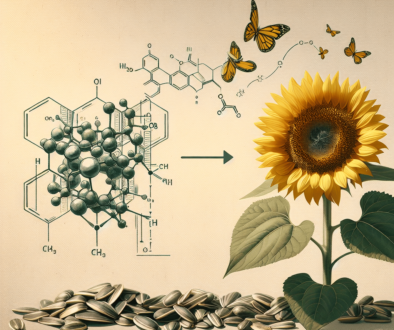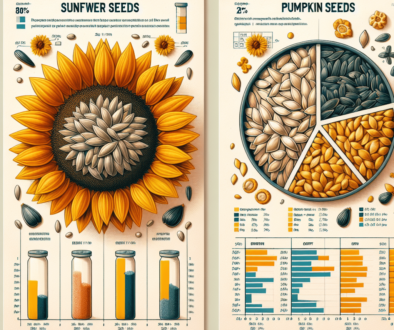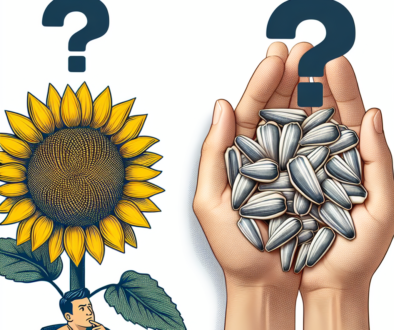Can You Eat Too Many Sunflower Seeds?
-
Table of Contents
- Can You Eat Too Many Sunflower Seeds? Understanding the Limits
- The Nutritional Profile of Sunflower Seeds
- Potential Risks of Overeating Sunflower Seeds
- Caloric Intake and Weight Gain
- Sodium Content
- Gastrointestinal Discomfort
- Exposure to Harmful Substances
- How Much Is Too Much?
- Healthier Ways to Enjoy Sunflower Seeds
- Conclusion: Balancing Sunflower Seed Consumption
- Explore ETprotein’s Protein Products
Can You Eat Too Many Sunflower Seeds? Understanding the Limits

Sunflower seeds are a popular snack enjoyed by many for their crunchy texture and nutty flavor. They are also praised for their health benefits, being a good source of vitamins, minerals, and healthy fats. However, as with any food, moderation is key. In this article, we will explore whether it’s possible to eat too many sunflower seeds and the potential health implications of overconsumption.
The Nutritional Profile of Sunflower Seeds
Sunflower seeds are packed with nutrients that are essential for good health. They are an excellent source of vitamin E, a powerful antioxidant that helps protect cells from damage. They also contain B vitamins, which are important for energy production and brain health, as well as minerals like magnesium, selenium, and zinc. Additionally, sunflower seeds are rich in healthy fats, particularly linoleic acid, which is a type of polyunsaturated fat.
- Vitamin E: Antioxidant properties
- B Vitamins: Energy and brain function
- Magnesium: Bone health and energy production
- Selenium: Immune system support
- Zinc: Wound healing and immune function
- Healthy Fats: Heart health and cholesterol regulation
Potential Risks of Overeating Sunflower Seeds
While sunflower seeds offer numerous health benefits, consuming them in excessive amounts can lead to several issues.
Caloric Intake and Weight Gain
Sunflower seeds are calorie-dense, which means they have a high number of calories relative to their serving size. Overeating sunflower seeds can contribute to an excessive caloric intake, potentially leading to weight gain if not balanced with physical activity.
Sodium Content
Many sunflower seeds available in stores are roasted and salted, which can significantly increase their sodium content. High sodium intake is associated with an increased risk of hypertension and cardiovascular disease.
Gastrointestinal Discomfort
Consuming large quantities of sunflower seeds, especially with shells, can cause gastrointestinal blockages or discomfort due to the indigestible nature of the shells.
Exposure to Harmful Substances
Some sunflower seeds may be contaminated with harmful substances like cadmium, a heavy metal that can accumulate in the body and cause kidney and bone damage over time.
How Much Is Too Much?
There is no one-size-fits-all answer to how many sunflower seeds are too many, as it depends on individual dietary needs and overall health. However, a general guideline is to limit sunflower seed consumption to a small handful (about 1 ounce or 28 grams) per day to avoid potential negative health effects.
Healthier Ways to Enjoy Sunflower Seeds
To enjoy the health benefits of sunflower seeds without overdoing it, consider the following tips:
- Choose unsalted or low-sodium varieties to keep sodium intake in check.
- Measure out servings instead of eating directly from the bag to control portion sizes.
- Incorporate sunflower seeds into balanced meals, such as sprinkling them on salads or mixing them into yogurt, rather than eating them alone as a snack.
- Opt for shelled sunflower seeds to avoid the risk of gastrointestinal issues associated with eating the shells.
Conclusion: Balancing Sunflower Seed Consumption
In conclusion, while sunflower seeds are a nutritious snack that can be part of a healthy diet, it is possible to eat too many. Overconsumption can lead to excessive calorie intake, high sodium levels, gastrointestinal discomfort, and exposure to harmful substances. By being mindful of portion sizes and choosing healthier varieties, you can enjoy the benefits of sunflower seeds without the risks associated with eating them in large quantities.
Explore ETprotein’s Protein Products
If you’re looking for alternative sources of protein that can be easily incorporated into your diet, consider ETprotein’s range of high-quality protein products. Their offerings include organic rice protein, clear rice protein, pea protein, clear pea protein, and various seed proteins such as watermelon, pumpkin, and sunflower seed protein. These products are non-GMO, allergen-free, and characterized by a neutral taste, making them a versatile addition to any meal or snack.
ETprotein’s sunflower seed protein is an excellent way to enjoy the benefits of sunflower seeds in a more concentrated and digestible form. It can be a great addition to smoothies, baked goods, or as a protein boost in your favorite recipes. For those interested in exploring the full range of ETprotein’s products, including their L-(+)-Ergothioneine offerings, please contact them at sales(at)ETprotein.com for more information or to request samples.
About ETprotein:
ETprotein, a reputable protein and L-(+)-Ergothioneine (EGT) Chinese factory manufacturer and supplier, is renowned for producing, stocking, exporting, and delivering the highest quality organic bulk vegan proteins and L-(+)-Ergothioneine. They include Organic rice protein, clear rice protein, pea protein, clear pea protein, watermelon seed protein, pumpkin seed protein, sunflower seed protein, mung bean protein, peanut protein, and L-(+)-Ergothioneine EGT Pharmaceutical grade, L-(+)-Ergothioneine EGT food grade, L-(+)-Ergothioneine EGT cosmetic grade, L-(+)-Ergothioneine EGT reference grade and L-(+)-Ergothioneine EGT standard. Their offerings, characterized by a neutral taste, non-GMO, allergen-free attributes, with L-(+)-Ergothioneine purity over 98%, 99%, cater to a diverse range of industries. They serve nutraceutical, pharmaceutical, cosmeceutical, veterinary, as well as food and beverage finished product distributors, traders, and manufacturers across Europe, USA, Canada, Australia, Thailand, Japan, Korea, Brazil, and Chile, among others.
ETprotein specialization includes exporting and delivering tailor-made protein powder and finished nutritional supplements. Their extensive product range covers sectors like Food and Beverage, Sports Nutrition, Weight Management, Dietary Supplements, Health and Wellness Products, and Infant Formula, ensuring comprehensive solutions to meet all your protein needs.
As a trusted company by leading global food and beverage brands and Fortune 500 companies, ETprotein reinforces China’s reputation in the global arena. For more information or to sample their products, please contact them and email sales(at)ETprotein.com today.












